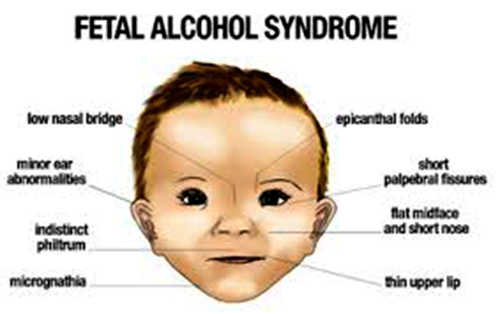
Foetal Alcohol Syndrome; A creeping danger
Apart of the negative effects of alcohol though well known, there is one disturbing trend which appears to have gone largely unnoticed in our part of the world.
This is clinically known as Foetal Alcohol Syndrome (FAS). In a recent interaction with the Head of the Child Health Department of the Korle Bu Teaching Hospital, Professor Ebenezer Badoe, he expressed concern about the increasing number of cases of children with symptoms of FAS reporting to the hospital.
FAS is likely to result when women drink alcohol while they are pregnant.
Prof. Badoe explained to the Daily Graphic that with FAS, three major categories of abnormalities occur. These include abnormal physical features such as small eyes, poorly developed philtrum (resulting in smoothening of the ridges that border the gutter between the nose and the mouth) and or flattening of the cheek area. Another characteristic is for the upper lip to become thinner than the lower one.
He added that another effect of alcohol on the unborn child was that there was always growth retardation that started in the womb and continued after delivery.
“Typically, such babies will be labelled as “asram baby” with the belief that bad spirits have invaded the child,” he stated.
He has, therefore, called for a massive educational campaign to educate women not to drink alcohol as soon as they think they could be pregnant since the condition was permanent.
In addition to the characteristics of FAS, the central nervous system is also targeted, resulting in mental retardation, learning disabilities and behavioural difficulties.
Children born with FAS will show diminished intellectual functioning and poorer academic performance during school age.
“The only way to prevent FAS is not to drink alcohol,” he advised.
Prof. Badoe said the very worrisome aspect of the situation was that the mothers of the children were not aware that the condition of their children was as a result of the alcohol they drank when they were pregnant.
He explained that there was no safe level of alcohol for a pregnant woman, Stressing that alcohol in whatever form or quantity was not safe for an unborn child.
He noted that a number of mothers with such children he had interacted with would not admit they drank alcohol even though they would say that they drank some herbs prepared for them with alcohol by their herbalists and pastors.
“Other mothers will say they drank only a little alcohol while some will also say they drank only pito.
“There is also this misconception out there that drinking alcohol could make labour easier; this is very false,” he stated.
Prof. Badoe observed that the era where women were not noted for drinking alcohol had given way to another in which women seemed to be matching men boot for boot since it had become culturally acceptable.
He described as particularly dangerous binge drinking, which is defined as five or more drinks per occasion.
He said heavy drinking was defined as two or more drinks per day; one drink is generally defined as 0.5 ounces of absolute alcohol.
“The timing of alcohol exposure during pregnancy, the amount of alcohol consumed and the pattern of alcohol use (binge versus chronic consumption) and probable maternal genetic predisposition to alcohol effects on the developing foetus are all variables that influence the expression of alcohol use on the foetus,” he explained.
Prof. Badoe noted that some of the symptoms such as hernia of the umbilicus and groin, abnormal palmar creases, poorly formed part of the ear, drooping eyelids, squint, small fingernails, small teeth with faulty enamel, and cleft lip were all common features seen in the foetal alcohol syndrome spectrum in the country.
He said the perception among health workers that FAS was prevalent in foreign countries and not locally had been proved wrong.
He, therefore, advanced the need for the country to conduct large-scale prevalence studies on the problem and educate women continuously on the dangers of alcohol during pregnancy.
Writer’s e-mail:
